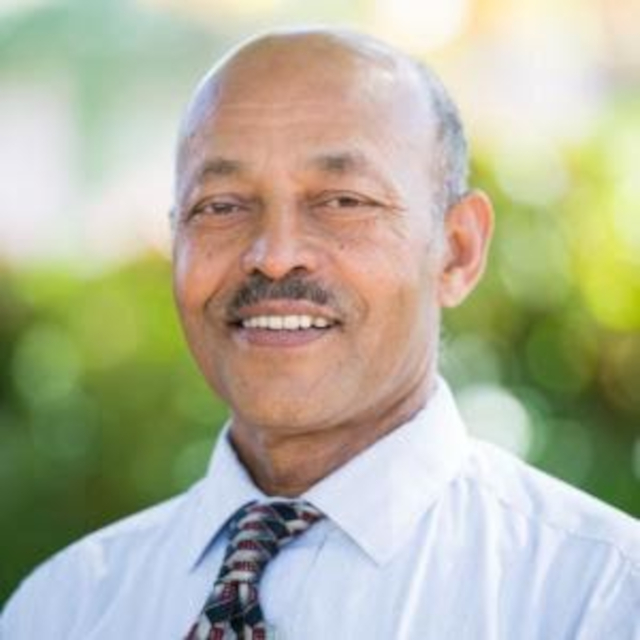Integrated Watershed Management and Agroforestry to Address Food Security and Environmental Degradation in the Angereb Watershed, the Blue Nile River Basin, Ethiopia

Dr. Bishaw's research work focuses on international forestry and agroforestry: integrating cropland and forest management in both developing and temperate regions of the world to create more resilient and healthy systems that benefit from improved nutrient cycles and less-intensive resource needs. Mitigating deforestation while increasing food security is a vital component of future land-use initiatives. Dr. Bishaw's research explores the economic and environmental potential of climate-smart agriculture and how to maximize these benefits in the Blue Nile River Basin of Ethiopia.
—Evie Vermeer, MESM 2023, Forest Sustainability Fellow
Watch a recording of this talk here
FOREST SUSTAINABLITY FELLOWSHIP PROGRAM SPEAKER
ABSTRACT
Forests and trees provide food, fuelwood and construction materials and many environmental benefits, such as erosion control, clean water and air, biodiversity conservation and carbon sequestration. The forest covers in Ethiopia and that of the Blue Nile River Basin in particular have been deteriorating at a progressive rate. The situation is even worse in the Angereb Watershed. The major causes of deforestation and environmental degradation in Ethiopia are increasing population, increasing demand for farmlands, and increasing demand for fuelwood to cook food and construction materials. The effects of poor farming practices and lack of conservation are the main causes for the siltation of the Angereb Dam and the pollution of drinking water from the Dam. To address these environmental and livelihood problems, concepts of sustainability and ecosystem based approaches were applied. We involved different stakeholders, such as the Gondar City Administration, Bureau of Agriculture and Forestry, Department of Water Affairs, Farmers in the Angereb watershed, University of Gondar and the Corvallis-Gondar Sister Cities Association in the project. Through this participatory approach, the stakeholders identified the natural resource problems in the Angereb watershed, and proposed integrated watershed management involving soil and water conservation, agroforestry, tree planting and reduce siltation of the Dam. Through this project, we improved the tree nursery at Weleka, and raised multipurpose indigenous and exotic tree species for planting. Farmers were involved in tree planting and agroforestry practices, such as establishing riparian buffers along the streams, alley cropping for soil and water conservation by planting trees on terraces and agroforests/home gardens to address food security. Through this project, 2.5 million tree seedlings were planted on 560 hectares in the Angereb watershed in ten years. Since 2010, 19 water sources were constructed, including drilled wells, hand-dug wells and developed springs to provide clean drinking water for 1,700 households in Gondar city and the surrounding villages. We recommend scaling up the ecosystem based approaches, using lessons learned on agroforestry, tree planting, and soil and water conservation in the Angereb watershed to the larger Blue Nile River Basin. This will address environmental degradation, soil erosion and food security, which will have great impacts on survival of Lake Tana and extend the longevity of the Grand Ethiopian Renaissance Dam (GERD) by reducing siltation.
BIO
Dr. Bishaw is a part of the Department of Forest Ecosystems & Society at Oregon State University and conducts research related to agroforestry and social forestry, riparian management of agricultural lands, and international forestry. He has participated in research and program development in South Africa, Ethiopia and southern Africa (Malawi, Mozambique and Zambia). These projects have addressed various issues such as food security, watershed management, poverty alleviation and land degradation across the African continent. Dr. Bishaw was educated in Africa, Europe and the United States, and has over 35 years of experience in forestry, natural resources and agriculture education, research, outreach and administration. He received his PhD from Oregon State University in Forest Resources in 1993, and an MS in Tropical Forestry from the University of Dresden, Germany in 1985, and a BSc in Plant Sciences from Addis Ababa University, Ethiopia in 1979. He has served as the director of the International Programs, College of Forestry, Oregon State University. He has also served as the director of the Masters of Natural Resources degree program, director of the Sustainable Natural Resources and Forests and Climate Change Graduate Certificates in the College of Forestry, OSU.